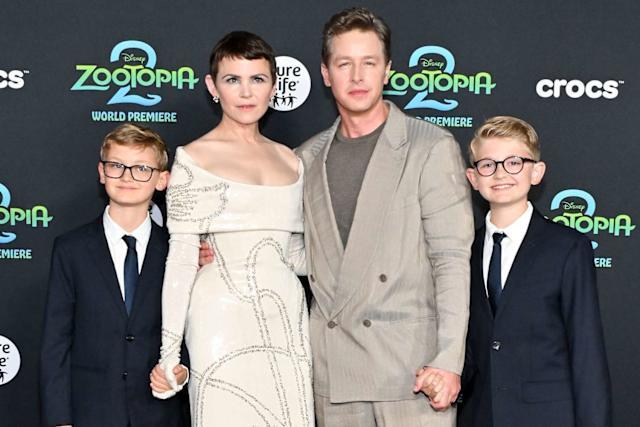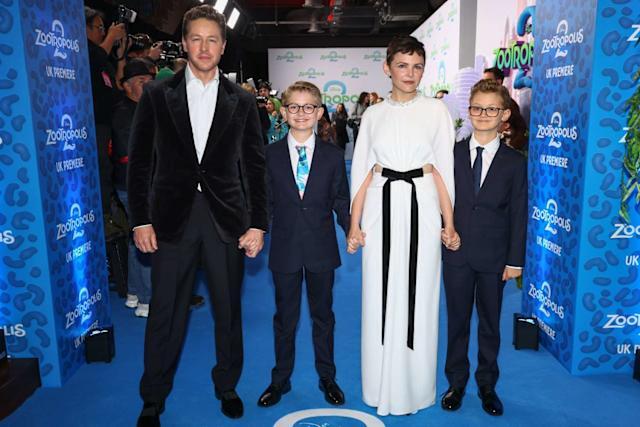For nearly ten years, fans of the wildly popular animated film “Zootopia” have wondered if the plucky rabbit officer Judy Hopps and her sly fox partner Nick Wilde would ever return to the big screen. The original movie, released in 2016, not only became a box-office hit but also embedded itself into popular culture with its blend of humor, heart, and surprisingly thoughtful social commentary. Yet despite its success, its sequel took almost a decade to materialize. Now, as “Zootopia 2” arrives in theaters on November 26, those closest to the project, including Judy Hopps’ voice actor Ginnifer Goodwin, say the long wait has paid off.
Goodwin, now 47, has spent a significant part of her career performing in both television and film, but animation offers her a unique opportunity. She says returning to Judy Hopps after so many years felt less like revisiting an old role and more like catching up with a long-lost friend she had grown alongside. Over that decade, Goodwin’s life changed in ways big and small—she became a mother, she evolved personally and professionally, and she experienced the original movie from an entirely different vantage point: as something she could share with her children. That shift, she says, deepened her connection to the character.
Having children also affected how her work is received at home. Goodwin jokes that while her sons are avid Disney fans, they are surprisingly uninterested in watching their parents act. She and her husband, actor Josh Dallas, starred together on the ABC fantasy series “Once Upon a Time,” where they portrayed an iconic fairy-tale couple. But their kids, currently 10 and 8, want nothing to do with watching Mom and Dad in make-believe worlds. According to Goodwin, their resistance isn’t rooted in embarrassment but in discomfort—they see their parents as theirs, not as actors slipping into other identities. Animation, however, seems to be the loophole. Her boys can accept her voicing an animated rabbit in a way they cannot accept seeing her in human form pretending to be someone else.
That emotional distance becomes important as Judy Hopps returns in the sequel, essentially the same determined, big-hearted bunny she was in the original. Goodwin describes Judy as morally driven and endlessly optimistic, characteristics that contrast sharply with her partner Nick Wilde’s jaded worldview. The dynamic between these two characters continues to anchor the new film, providing both comedic friction and heartfelt moments as they navigate a fresh chapter in Zootopia’s bustling urban jungle.
And visually, that jungle is more stunning than ever. The sequel takes advantage of nearly ten years of technological advancements, giving audiences an even more immersive experience. From the detailed fur textures of the characters to the meticulously crafted architecture of Zootopia’s neighborhoods, the movie creates an animal-run metropolis that feels alive, layered, and lovingly animated. The filmmakers lean into themes that resonate strongly in the modern world—topics such as land use, community displacement, and the prejudices that arise between different groups. These issues, though framed in the whimsical context of talking animals, reflect very real social challenges. Goodwin notes that the storytelling feels powerful not because it is subtle, but because it is sincere. The film invites audiences to think about the way differences shape relationships and communities, and how crucial it is to respect and understand those differences rather than fear them.
For Goodwin, the messaging struck a personal chord. She speaks about the movie not only as entertainment but as something that reflects her own evolving understanding of human relationships. With age and experience, she says, comes a deeper appreciation for what partnership means—whether in friendships, marriages, or creative collaborations. The sequel explores the tensions and harmonies within partnerships, making those dynamics central rather than incidental. As Judy and Nick confront new challenges, their differences become both obstacles and strengths, mirroring the complexities of real relationships.
While Goodwin celebrates the artistry and themes of “Zootopia 2,” she also shares an amusing anecdote about her recent experiment with artificial intelligence. Curious about how an AI program might interpret personality, she uploaded a photo of her dog and asked the system to generate the “human” version of him. The result, she confesses with a laugh, felt completely wrong to her. The AI transformed her canine companion into a fashionable hipster, an image she insists is wildly inaccurate. Though her dog is only five years old, Goodwin describes him as an old soul, the kind of creature who seems like he would sport a monocle and a bow tie if he could. The disconnect made her reflect on the limits of AI in capturing the essence of personality. To her, it served as a reminder that some qualities—like wisdom, gentleness, or a quirky sense of propriety—cannot be distilled through algorithms.

Her anecdote reflects a broader cultural conversation about art, creativity, and the irreplaceable nuances of human interpretation. In a world increasingly influenced by AI-driven creative tools, Goodwin’s experience underscores a point many artists share: technology can mimic patterns, but it cannot fully grasp intention, emotion, or soul. Just as “Zootopia” uses anthropomorphic animals to explore human social issues, Goodwin’s story about her dog highlights the gap between digital logic and the messy, lived realities of personality.
The contrast between Goodwin’s playful interaction with AI and the thoughtful messages of the “Zootopia” sequel paints a portrait of an actress who approaches her craft and her life with curiosity and humor. Her connection to Judy Hopps has grown not just through professional commitment, but through lived experience—navigating parenthood, aging, career changes, and the cultural transformations of the past decade. When she speaks about returning to the recording booth, she describes it less as stepping back into a role and more as revisiting someone she knows deeply.
The filmmakers seem to have taken a similarly reflective approach. A decade is a long time in the world of animation, and the creative team behind “Zootopia 2” appears to have embraced that stretch of time rather than rushing to capitalize on the original film’s success. The pacing allowed them to think carefully about what a sequel should be—how it could expand the world without repeating itself, and how it could reaffirm the emotional truths that resonated so strongly the first time. That patience shows in the details, both visual and narrative. The resulting film feels like a labor of love rather than a fast-tracked studio project.
Fans of the first movie will likely appreciate the way the sequel honors its predecessor while pushing the story into new territory. As Judy and Nick face evolving moral dilemmas and social challenges, the film invites viewers—whether children or adults—to reflect on their own communities and relationships. The balance of humor, adventure, and heart remains intact, but the added depth speaks to a world that has changed since 2016. Conversations about justice, identity, and empathy have grown louder, more complex, and more urgent. “Zootopia 2” enters that landscape with a sense of purpose, using whimsy to soften its edges but not to dilute its message.
Goodwin’s reflections tie all of these pieces together. Her decade-long relationship with Judy Hopps mirrors the decade-long journey of the film itself. Both actress and character have evolved in ways that feel authentic to the passage of time. And perhaps that is what makes the sequel compelling—not simply that it continues the story, but that it acknowledges growth, change, and the ways we learn to see the world differently as life unfolds.
As audiences prepare to return to the world of Zootopia, they bring with them their own experiences from the past ten years. Children who once watched Judy Hopps take on her first big assignment may now be old enough to understand the film’s deeper themes. Adults who connected to the original movie’s social commentary may find even more to reflect on in the sequel’s exploration of prejudice, land rights, and partnership dynamics. And parents like Goodwin, now watching alongside their children, may encounter the story with entirely new eyes.

In this sense, “Zootopia 2” is not just a continuation but a reunion—a chance for viewers and creators alike to revisit a beloved world with changed perspectives. The film arrives not as a nostalgic callback but as a timely conversation, wrapped in vibrant animation and carried by characters who have already earned a place in the hearts of millions. For Goodwin, the opportunity to revisit Judy Hopps underscores the unique magic of storytelling: the ability to grow with a character, to see oneself reflected differently over time, and to share that experience with the next generation.
And so, nearly a decade later, Judy Hopps hops back onto the screen, still brave, still optimistic, and still determined to make her world a better place. Her return feels not delayed, but right on time.










